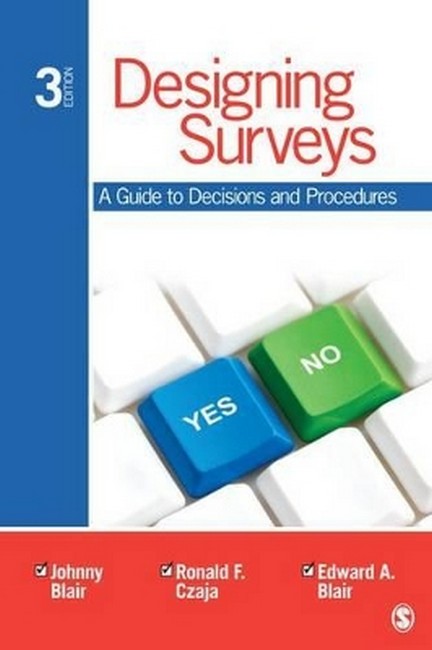Johnny Blair is an independent consultant. Previously, he was a principal scientist and senior survey methodologist at Abt Associates Inc., where he directed the Cognitive Testing Laboratory. He has conducted research on sampling rare populations, measurement error in proxy reporting, and cognitive interviewing for pretesting survey instruments. He has been a member of the Design and Analysis Committee, which provides statistical advice for the National Assessment of Educational Progress (NAEP), often referred to as The Nation's Report Card. He has served on National Research Council panels to assess major government-sponsored surveys. His research publications include many book chapters and over 50 articles in academic journals and in the Proceedings of the Joint Statistical Meetings of the American Statistical Association Section on Survey Methods. He served two terms on the editorial board of Public Opinion Quarterly and is a frequent peer reviewer for several other research journals. Ronald Czaja, associate professor (retired) of sociology and anthropology at North Carolina State University, taught courses in both undergraduate and graduate research methodology and medical sociology. His methodological research interests focus on sampling rare populations, response effects in surveys, and the cognitive aspects of questionnaire design. From 1969 to 1990 he was at the Survey Research Laboratory, University of Illinois at Chicago, as project coordinator, co-head of sampling, assistant director, and principal investigator. Edward Blair is the Michael J. Cemo professor of marketing and entrepreneurship and chair of the Department of Marketing and Entrepreneurship in the Bauer College of Business at the University of Houston. He has been chair of the American Statistical Association Committee on Energy Statistics, which advises the U.S. Energy Information Administration on statistical matters, and previously served on the U.S. Census Bureau Advisory Committee. He has been a National Science Foundation panelist, national conference chair for the American Marketing Association, editorial board member for Journal of Marketing Research, Journal of the Academy of Marketing Science, and Journal of Business Research, and instructor in sampling and survey methods for the American Marketing Association School of Marketing Research. His research interests include survey sampling and cognitive aspects of survey methodology.
Request Academic Copy
Please copy the ISBN for submitting review copy form
Description
1. Survey Practice 2. Survey Error 3. Planning the Survey: The Hierarchy of Decisions 4. Data Collection I: Selecting a Method 5. Sampling I: Concepts of Representation and Sample Quality 6. Sampling II: Population Definition and Frames 7. Sampling III: Sample Size and Sample Design Methodology Appendix 1: Using Models in Sampling 8. Questionnaire Development I: Measurement Error and Question Writing 9. Questionnaire Development II: Questionnaire Structure Methodology Appendix 2: Questionnaire Evaluation Workshop 10. Questionnaire Development III: Pretesting Methodology Appendix 3: Cognitive Interviewing Workshop 11. Data Collection II: Controlling Error in Data Collection Methodology Appendix 4: An Overview of Organization Surveys 12. Post-Survey Statistical Adjustments and the Methodology Report Appendix A: UM Undergraduate Student Survey Appendix B: Maryland Crime Survey Appendix C: AAPOR Code of Professional Ethics Appendix D: Internet Resources
"This book has much to recommend it. The authors succeed in pulling off some difficult balancing acts. They manage to introduce a good deal of material in a concise package. They cover key topics in practical, accessible terms, but not in simple cookbook terms. The entire survey research process is covered in a way that helps students appreciate how steps in the process are integrated. Students will understand that survey research is research, not just a series of tasks." -- Julio Borquez "Many of our students do not have prior methods experience. They need a text that brings them into the methodology of the field and this one is just right. The concrete examples are especially helpful. Students tell me that this text is one that they keep and use over and over. It is the kind of text that empowers them to walk through the steps of doing their research." -- Brenda D. Phillips "Without fail, my students are very interested in the practical aspects of survey design and implementation. They want to understand, quickly and simply, the workflow of a survey project, how many observations they need to answer their research questions, and how much it is going to cost. Not surprisingly, then, I find the applied focus of the text very helpful. The coverage of sampling and power calculations for hypothesis testing are unique strengths. The text is accessible, practical, and concise." -- Chadwick L. Menning "Designing Surveys is well written and is intended for novices engaged in designing a (student) survey for the first time as well as for those with some knowledge of and experience with surveys. I would add a third group of potential readers to the list: more experienced researchers who feel the need to update and refresh their knowledge." -Edith D. de Leeuw, University of Amsterdam, Amsterdam, The Netherlands -- Edith D. de Leeuw * Edith D. de Leeuw * I have no hesitation in recommending this book as a preferred course text at post-graduate level or for in-house training. It's far superior to anything else on the market and sits nicely between Andres (2012) and Marsden and Wright (2010). Whereas some books tend to be more academic (and sometimes based on limited, if any, serious experience of actually doing surveys) this book is written by people who do surveys for a living, one of them for forty years. With its combination of accumulated wisdom and narrative skill, it's easy (and fulfilling) to read, and you can barely see the joins. It has been written by very experienced fellow professionals used to dealing with operational practicalities, spiced with (just enough, but not too much) theory and thankfully few equations (formulae are immediately off-putting for students in sociology and similar areas). -- John F Hall

